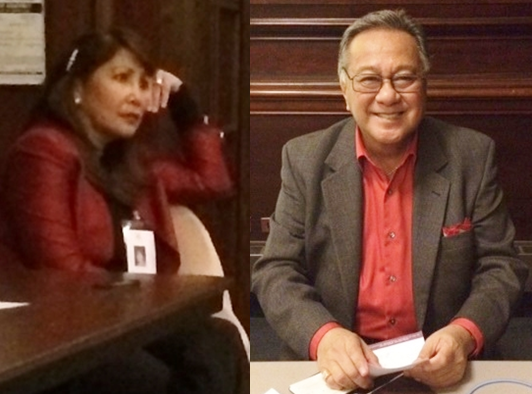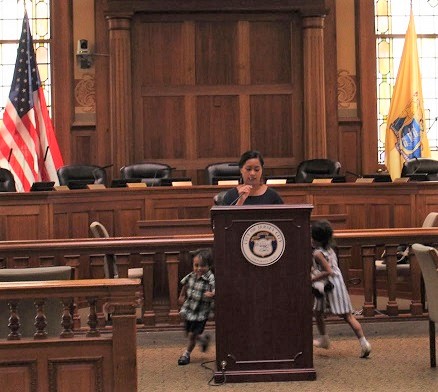A bittersweet memoir of hope, family devotion and one deportation after another
By Cristina DC Pastor
Feet in Two Worlds
Even by Filipino standards, Jen Furer’s immigration journey is one colossal heartache: Her entire family, meaning her parents and five brothers, were deported after living in the U.S. for several years. The worst episode came when a brother in California and another in New Jersey got their “knock on the door” on the same day.
All’s well for Furer, 48, now a stay-at-home mom with four beautiful children and married to a Jewish IT executive. She survived to tell her story in “Out of Status,” a memoir about her journey from the Philippines to the U.S. and the significant lessons learned along the way – choosing immigration lawyers carefully, remaining steadfast as a family, and never coming to the U.S. and hiding from the law because that’s where Furer’s troubles began. While she is now on the mend legally, financially and emotionally, her parents and brothers are back in the Philippines hoping to return on the strength of her family-based petition.
But first, her story.
In 1984, Jennifer Dampur flew to the U.S. on a traveler’s visa to attend her grandparents’ 50th wedding anniversary. At the back of her mind, this young graduate of Psychology and Guidance Counseling from a private girls school in Manila knew she would never come back.
“I was the first in my family to come to America,” she told this reporter. She had thought that with youth, a pleasant personality, college degree and facility with the English language, doors would open for her.
They did but would quickly shut when potential employers learned about her status. She had considered filing for political amnesty but even that did not work out. Eventually, she found work at the IT department of a major retail store and would meet her future husband Craig Furer there.
One by one, members of her family followed her on the same ruse of being a tourist and then getting lost within the labyrinthine American landscape. By late 1980s, the entire Dampur family was in the U.S. They were able to convert their tourist visas to H1-B and H2-B employment-based visas. Her parents, who used to export apparel while in the Philippines, set up a garments business financed partly by friends and former associates. There would be the incessant run-ins with bogus and corrupt immigration attorneys – including one who was disbarred while working on their case. Through it all, the family went about their daily lives – got married and had kids — as if they were naturalized Americans. No one but themselves knew that there was a ticking time bomb every time one of their visas expired.
“I went through the whole craziness,” said Furer in an interview. “We hired lawyer after lawyer, but they all ended up getting deported.” The day the family was deported in mid-2000, she said, felt like “the world ended.”
Writes Furer in her book: “For about 20 years my family paid their taxes yearly, did not commit any crimes, did not ask for welfare, assimilated with the community, created new ties with the neighborhood, worked hard, tried their fate with various businesses, and raised 10 new grandchildren who lovingly call them Mama and Papa. They dreamt of one day taking that oath of citizenship…”
By that time, Furer was already married and a greencard holder. Her Long Island-born husband, who comes from a Jewish family, knew about her immigration status as well as a previous divorce from a Filipino-Canadian man.
“I call him my romantic super hero,” Furer became emotional talking about her husband Craig.
Her parents and three brothers have remained in the Philippines hoping to rejoin Furer and two brothers who managed to return to the U.S. legally. She has an outstanding family-based petition to get all of them back in the country.
“I know it would take at least 20 years to get them back,” she said, pragmatic but undefeated.
Furer said her experience clearly shows how seriously the immigration system needs fixing, and how it can bankrupt families desperate to legalize their status. For one thing, she wondered why it would take families decades to be reunited. She also questioned why government can’t seem to run after attorneys who prey on out-of-status immigrants.
“We’re not rich, but if you want to get your status in order you may end up using all your money on lawyers that will give you false hopes,” she said.
She cautioned immigrants from attempting to “go under the radar,” especially against doing it on their own. “It’s really difficult, and when you get caught it’s horrible,” she said.
She is hoping that through her book, she may be able to “educate, challenge, inspire and make a difference.”
This article originally appeared in Feet in Two Worlds, a publication that brings the work of immigrant and ethnic media journalists from communities across the U.S. to public radio and the web.













[…] Furer is the author of ‘Out of Status,’ a memoir about her journey from the Philippines to the U.S. and the significant lessons learned […]